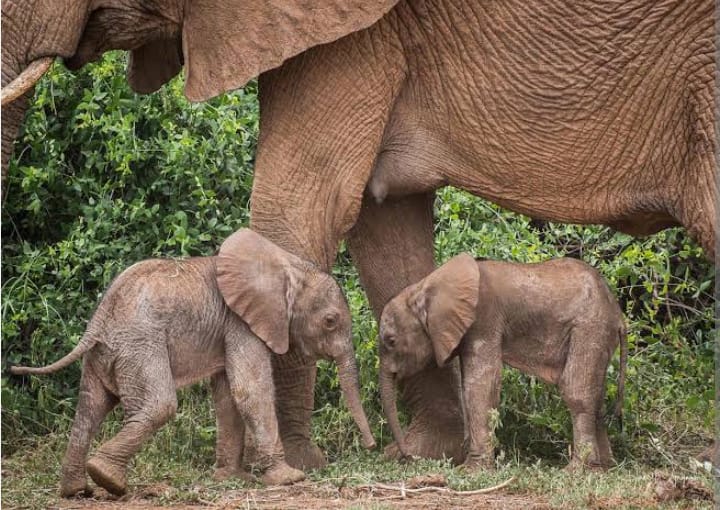
“Matiny Koho Beliot komaiye saramek” this is a Kalenjin proverb coined by Kalenjin elders long time ago. It translates to no matter how big an elephant is, it never gives birth to twins. But this proverb has been broken for the second time in Kenya and both from Samburu Reserve.
Recently, A video of a mother Elephant grazing with it’s set of twins has been going viral. It was first posted by a conservation group sharing the joy of this rare event of the planet’s largest land mammal with the entire world.
According to this group, the twins both female and male were born to a mother named Alto. This makes it the second occurrence from the same place as early in 2022 another pair one male and female had been born.
ALSO READ: Community Healthcare Promoters: Inside Ruto’s healthcare strategy
Twins make up only about one percent of Elephant births. Owing to the fact that elephants have the longest gestation period of up to 22 months and give birth roughly every four years.
Giving birth to twins becomes almost an impossible narrative. And if it does it could be influenced by factors such as genetics, hormonal factors, age of the mother-elephant and environmental factors, however when twin Elephants are born, they usually face challenges and both mother and the calves might have a higher risk of health complications.
“About two years ago, an elephant named Bora gave birth to twins in the Samburu National reserve. Bora’s twins were born during one of the worst droughts and despite trying her best to bring them up, the female twin sadly died,” Save the Elephants had said in their Facebook post.
With this in mind, the conservation says they have high spirits that Alto’s twins would survive owing to the fact there is food in plenty following the ongoing rains. This would make Alto produce enough milk to feed her calves.
“Elephants twins rarely survive in the wild but we are optimistic about Alto’s twins as there’s lots of food in the park following the rains so Alto should be able to produce plenty of milk to feed her hungry brood plus she also has the amazing support of her heard,” the group wrote.
African Savanna elephant has since been classified as endangered by the International Union for Conservation of Nature (IUCN). It says poaching and habitat destruction had a devastating effect on elephant numbers in Africa as a continent.
According to Kenya Wildlife Service (KWS), there are more than 36,000 elephants in East Africa and with efforts to stem poaching, it’s hoped it will halt the decline in numbers. The elephant population in Kenya has stood at 170,000 in the 1970s and early 1980s but had since plunged to only 16,000 by the end of 1989 due to demand for the ivory.
This new twins now puts Kenya at a limelight as it could highly boost the economy in form of tourism especially now with the festive seasons approaching and Kenya being a preferred destination for such for many across the world.






